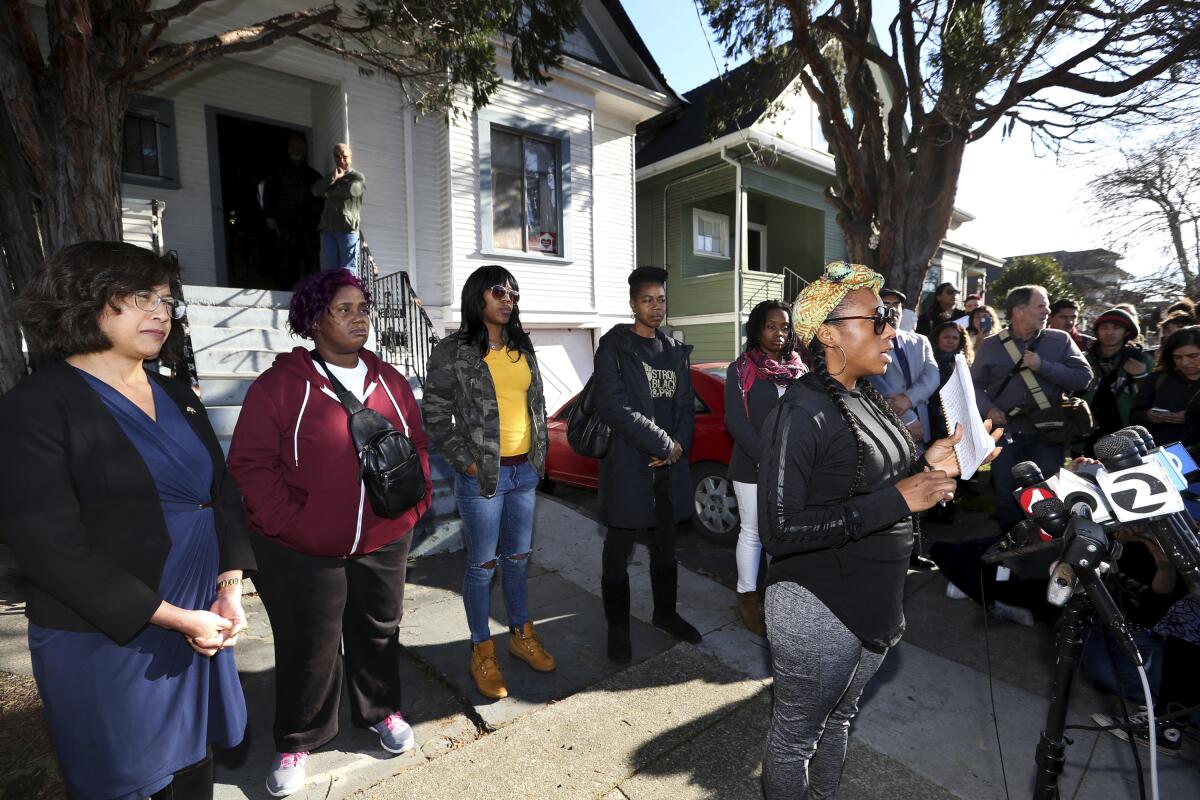Moms squatting in home to protest Bay Area housing crisis are kicked out by deputies

Four members of an activist group rallying against the Bay Area’s housing crisis were arrested before dawn Tuesday when law enforcement served an eviction notice on a home in West Oakland where a group of women had been squatting since November.
The group, known collectively as Moms 4 Housing, took control of the unoccupied white-and-blue house on Magnolia Street two months ago in what they said was a bid to call attention to rapid gentrification that’s reshaping the Bay Area amid widespread homelessness. The area also is in the midst of a housing crisis in which investor-owned properties sit vacant while working people struggle to afford to live in their own neighborhoods.
The activists, who moved into the home with their children, were previously either homeless or on the brink of homelessness. They said the property had been vacant for years.
“The Moms for Housing are uniting mothers, neighbors and friends to reclaim housing for the Oakland community from the big banks and real estate speculators,” the group wrote on its website.
Alameda County sheriff’s deputies and crisis negotiators descended on the three-bedroom, one-bathroom home about 5:15 a.m., instructing anyone inside the building to exit with their hands above their heads. A crowd of protesters stood by, chanting, “Let the moms go,” filming the situation and, at times, arguing and swearing at deputies.
Deputies arrived earlier than usual Tuesday morning, prepared for a backlash from protesters who in previous days “had formed human chains in front of the home and had vowed to fight police,” Sgt. Ray Kelly said.
Three people who were inside the home told authorities they were passively resisting being evicted, Kelly said. After a few minutes, the deputies entered the home, bound the women’s hands with plastic ties and escorted them out. The names of the individuals taken into custody were not immediately available.
Wedgewood, a Redondo Beach real estate investment company that specializes in “distressed residential real estate,” purchased the Oakland property at a foreclosure auction over the summer for a little more than half a million dollars — 10 times what the property last sold for in 1997.
Sam Singer, a spokesman for Wedgewood, told the Mercury News in December that the women squatting there had stolen the house.
“There’s a real simple bottom line, which is you can’t steal people’s property,” he told the news outlet. “The home belongs to Wedgewood and the many people who invest in Wedgewood. And the women took this house — stole this house — and have no right to it.”
Wedgewood served the women with an eviction notice in early December, which the group vowed to fight. Large groups have rallied outside the house on multiple occasions over the past months, and several City Council members have voiced their support for the women.
But on Friday, Alameda County Superior Court Judge Patrick McKinney ruled that they had no right to stay in the home. His decision gave the sheriff’s office authority to evict the group within five days.
Lawyers for Dominique Walker, a member of the group, argued during the hearing that housing was a right and that the court must give the women the right to possess the house, especially because it sat vacant for so long and the alternative would be to send the women to live on the streets.
“Wedgewood wants to pretend we don’t exist, that their actions don’t have real-life consequences for Oaklanders,” Walker said in a prepared statement in December. “We’ve had hundreds of our supporters calling and emailing them. We’ve sent letters from ourselves and supporting organizations. But Wedgewood has refused to sit down with us to talk.”
The Associated Press contributed to this report.
More to Read
Sign up for Essential California
The most important California stories and recommendations in your inbox every morning.
You may occasionally receive promotional content from the Los Angeles Times.












